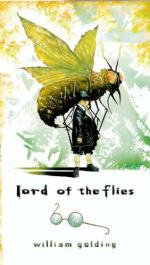|
|
Lord of the Flies Author/Context
William Golding (1911-1993)
Golding was born in St. Columb Minor in Cornall, England on September 19, 1911, to Alec A. and Mildred Golding. After being educated at Marlborough Grammar School where his father was a teacher, he studied the sciences for two years at Brasenose College, Oxford until abandoning science in favor of English language and literature, particularly that of the Anglo-Saxon period. After graduating Oxford in 1935 he worked in a London settlement house and devoted his spare time to writing and acting in "very, very far-off-Broadway theater." In 1939 he began teaching philosophy and English at Bishop Wordsworth's School in Salisbury. At the onset of World War II he joined the Royal Navy at the age of 29 and was involved in several major conflicts including the sinking of the German battleship Bismark and, during the invasion of France in 1944, commanded a rocket-launching craft. At the close of the war he resumed teaching in Salisbury until 1961.
In the post-war period following his return to civilian life, the focus of his writing turned to mimic the current popular style . However, after three such books were rejected for publication, he decided simply to write for himself, for pleasure, rather than with an intent to please the public. Thus in 1954, surprisingly, the release of Lord of the Flies was met with great success in Britain. However, his true rise to popularity came in 1959 when the first editions were published in the United States. Quickly becoming a campus favorite, rivaling even J. D. Salinger's Catcher in the Rye, Lord of the Flies soon earned Golding enough money to retire from teaching in 1961 to write full-time. Other writings include The Inheritors (1955), Pincher Martin (1956), Free Fall (1959), The Spire (1964), The Pyramid (1967), Darkness Visible (1979), a trilogy consisting of Rites of Passage (1980), The Paper Men (1984), Close Quarters (1987), and Fire Down Below (1989), as well as several plays and various essays.
However, with the presentation of each novel after Lord of the Flies, his works met with increasing controversy among British and American audiences alike. As he continued with his plan of "writing for himself," each new literary piece generated misunderstanding and evoked greater and greater confusion amongst his readers. Described as an "allegorist," his consistent theme throughout his later, unsuccessful works seemed to be the same as in Lord of the Flies: man's capacity for evil and his ultimate isolation and loneliness. Golding was awarded the Nobel Prize for literature in 1983 and was knighted in 1988. Until his death on June 19, 1993 in Perranarworthal, Cornwall, he resided in Wiltshire, England with his wife who bore him two children. His interests included: sailing, archaeology, playing the piano, cello and oboe. In naming his mentors for writing, he shouts "thunderous great names like Euripides, Sophocles, and perhaps even Herodotus" because "his favorite reading is still Greek literature and history, in the original [language]." Indeed, his philosophy of human existence is one much closer rooted to the ancient Greeks than to any contemporary view. Until his death, it would seem, he continued this idea of "writing for himself"--the purpose for writing, Golding once said, is to help people "to understand their humanity."
Bibliography
Contemporary Authors, "Golding, William." Vol 5-8 (condensed), 1969 edition, pp. 449-451.
Donoghue, Denis. "Golding, William Gerald," in Colier's Encyclopedia, 1992 edition, pg. 202.
Encyclopedia Britannica. "Golding, Sir William." Vol 5, 1998 edition, pg. 344.
Galloway, David. "Golding, William Gerald," in Encyclopedia Americana, 1997 edition, pg. 34.




